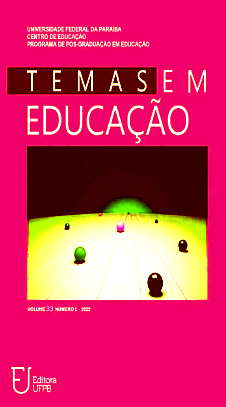YOUNG PEOPLE WITH DISABILITIES
A study on curricular practices experienced in high school
DOI:
https://doi.org/10.22478/ufpb.2359-7003.2024v33n1.68458Keywords:
Curricular Practices, High School, Young People with DisabilitiesAbstract
Field research was carried out in a public school in the state network of Pará, in the municipality of Belém, with the aim of analyzing the curricular practices experienced by young people with disabilities in regular high school in 2019. Two young people with disabilities were interviewed, being these, a student enrolled in the 2nd year, diagnosed with autism spectrum disorder and another student enrolled in the 3rd year, diagnosed with intellectual disability. Through the categorization process of Oliveira and Mota Neto (2011), the study examined the participation of these young people in learning activities and the relationship with inclusion policies. The results point to non-dialogical curricular practices in the classroom, activities aimed merely at achieving grades in the curricular components, adjustments in the accessibility process for carrying out assessment tests that do not ensure the learning of school knowledge, devaluation of extracurricular experiences and invisibility in teacher-student relationships with disabilities. On the other hand, family support practices, specialized educational assistance, cultural resistance of students with disabilities, youth protagonism and dialogical learning were evident. These findings highlight the urgent need to promote fairer curriculum practices that value inclusion and recognize the capabilities of young people with disabilities.
Downloads
References
BRASIL, Ministério da Educação. Política Nacional de Educação Inclusiva na Perspectiva da Educação Inclusiva. Documento elaborado pelo Grupo de Trabalho nomeado pela Portaria Ministerial nº 555, de 5 de junho de 2007, prorrogada pela Portaria nº 948, de 09 de outubro de 2007.
CARVALHO, Janete Magalhães. Práticas pedagógicas nas múltiplas redes educativas que atravessam o currículo. In: LIB NEO, J. C.; ALVES, N. (org). Temas de pedagogia: diálogos entre didática e currículo. São Paulo: Cortez Editora, 2012. p. 189-205.
CAST UDL, About CAST. 2024. Disponível em: https://www.cast.org. Acesso em 08 fev. 2024.
FERNANDES, Ana Paula Cunha dos Santos. A escolarização de pessoas com deficiência nas comunidades ribeirinhas da Amazônia Paraense. 2015. Tese (Doutorado em Educação Especial) – Centro de Educação e Ciências Humanas, Universidade Federal de São Carlos, São Carlos, 2015.
FERNANDES, Ana Paula Cunha dos Santos. Família, escola e pessoa com deficiência. Revista Teias, Rio de Janeiro, v. 19, n. 54, p. 408-421, 2018. Disponível em: https://www.e-publicacoes.uerj.br/index.php/revistateias/article/view/32809. Acesso em: 23 ago. 2020.
FREIRE, Paulo. Pedagogia da Autonomia: saberes necessários à prática educativa. 15. ed. São Paulo: Paz e Terra, 1996.
FREIRE, Paulo. Pedagogia da Tolerância. São Paulo: Editora Unesp, 2005.
GIROUX, Henry. Atos Impuros: a prática política dos estudos culturais. Porto Alegre: Artmed, 2003.
GIROUX, Henry. Escola Crítica e Política Cultural. 3. ed. São Paulo: Cortez, 1992.
GOODSON, Ivor F. Currículo: teoria e história. 15. ed. Petrópolis: Vozes, 2018.
KASSAR, Mônica de Carvalho Magalhães. Escola como espaço para a diversidade e o desenvolvimento humano. Revista Educação e Sociedade, Campinas, v. 37, n. 137, p. 1223-1240, 2016. Disponível em: https://www.scielo.br/j/es/a/3pZfQcXscKP5rN6T94Pjfrj/?lang=pt. Acesso em: 10 set. 2019.
OLIVEIRA, I. A.; MOTA NETO, J. C. A construção de categorias de análise na pesquisa em educação. In: MARCONDES, M. I.; OLIVEIRA, I. A.; TEIXEIRA, E. (org.). Abordagens Teóricas e Construções Metodológicas na Pesquisa em Educação. Belém: EDUEPA, 2011. p. 161-179.
PLETSCH, Márcia Denise. et al. Acessibilidade e Desenho Universal na Aprendizagem. Campos dos Goytacazes: Encontrografia, 2021.
PLETSCH, Márcia Denise. Repensando a inclusão escolar: diretrizes políticas, práticas curriculares e deficiência intelectual. 2. ed. Revista e ampliada. Rio de Janeiro: NAU, 2014.
LOPES, Alice Casemiro; MACEDO, Elizabeth. O pensamento curricular no Brasil. In: LOPES, Alice Casemiro; MACEDO, Elizabeth. (org.). Currículo: debates
contemporâneos. 2. ed. São Paulo: Cortez, 2005.
PEREIRA, C. D.; LUNARDI-MENDES, G. M.; PACHECO, J. A. B. Políticas de
inclusão escolar no Brasil e em Portugal: desafios para a justiça curricular. Revista
Teias, Rio de Janeiro, v. 19, n. 55, p. 36-53, 2018. Disponível em: https://www.epublicacoes.uerj.br/index.php/revistateias/article/view/37597. Acesso em: 08 fev. 2024.
PRAIS, Jacqueline Lidiane de Souza. Das Intenções à Formação Docente para a Inclusão: contribuições do desenho universal para a aprendizagem. Curitiba: Appris, 2017.
SACRISTÁN, José Gimeno. Educar e Conviver na Cultura Global: as exigências da cidadania. Porto Alegre: Artmed, 2002.
SACRISTÁN, José Gimeno. O Currículo: uma reflexão sobre a prática. 3. ed. Porto Alegre: Editora Penso, 2017.
SILVA, Tomaz Tadeu da. Documentos de Identidade: uma introdução às teorias do currículo. 3. ed. Belo Horizonte: Autêntica Editora, 2019.
SOUZA, F. S; PLETSCH, M. D. A relação entre as diretrizes do Sistema das Nações Unidas (ONU) e as políticas de Educação Inclusiva no Brasil. Ensaio: Avaliação e Políticas Públicas em Educação. Rio de Janeiro, v. 25, n. 97, p. 831-856, 2017. Disponível em: https://www.scielo.br/j/ensaio/a/7dvMYywhKCgCSwjk4ZFSW5g/abstract/?lang=pt. Acesso em: 08 fev. 2024.
SKRTIC, Thomas. Disability and Democracy: reconstructing (special) education for postmodernity. New York: Teachers College Press, 1995.
Downloads
Published
How to Cite
Issue
Section
License
Copyright (c) 2024 Revista Temas em Educação

This work is licensed under a Creative Commons Attribution 4.0 International License.
Authors who publish in this journal agree to the following terms:
. Authors retain the copyright and grant the journal the right to first publication, with the work simultaneously licensed under the Licença Creative Commons Attribution that allows the sharing of the work with acknowledgment of authorship and initial publication in this magazine. . Authors are authorized to assume additional contracts separately, for non-exclusive distribution of the version of the work published in this journal (eg, publishing in institutional repository or as a book chapter), with acknowledgment of authorship and initial publication in this journal.
. Authors are permitted and encouraged to publish and distribute their work online (eg in institutional repositories or on their personal page) at any point before or during the editorial process, as this can generate productive changes, as well as increase impact and citation of the published work (See O Efeito do Acesso Livre).



















